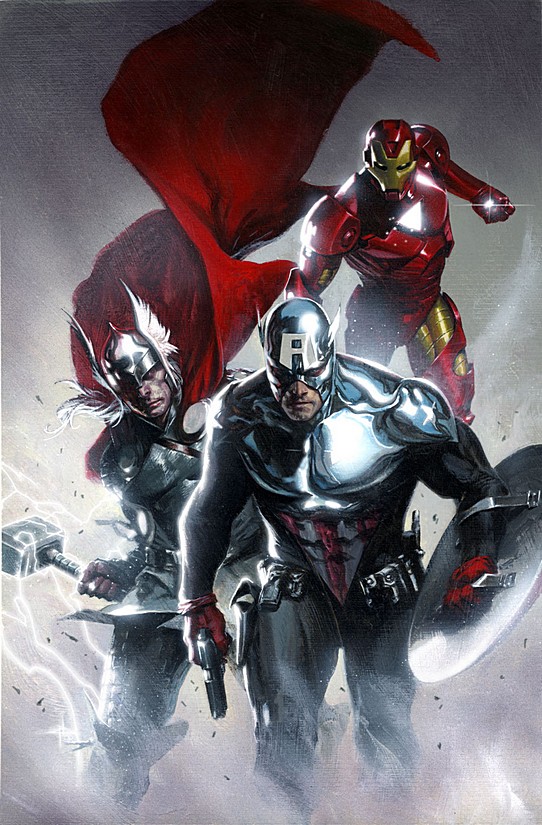 Home Reviews About us Feedback Links | Secret InvasionWriter: Brian Michael BendisArtist: Leinil Francis Yu Marvel Comics
What you have here is a decent storyline which has been
overhyped to the point of death. This isn't a reference to Marvel's marketing blitzkrieg
ahead of the event, but the years of storyline which led up to the invasion,
all of which were told in hushed, seismic tones - full of weighty and
self-important dialogue, and a general feeling that we were witnessing some of the most crucial
events in the Marvel universe's long history. That really isn't the case. It's becoming increasingly clear – and again, it gives me no
pleasure to say this – that Bendis is far better at writing engaging, witty dialogue,
and sophisticated stories than he is dealing with thematic or conceptual
content. These are superhero stories, and they are not designed to be high art,
but with DC producing astute, important work on themes of paranoia and
mistrust, Marvel's offering – along the same lines – totally fails to offer anything
but the most superficial treatment of the issues it raises. It's worth noting
that Marvel's deepest, most interesting story – Civil War – was the only recent
event not to be penned by Bendis. It's best to start with the nuts and bolts of a large-scale
event book – the battle sequences. Bendis' form on these things is becoming
increasingly standard and uninspired. There's a big battle at the beginning,
then atomised groupings, then a large final battle. If you've been keeping
track of his New Avengers run you'll not be surprised by the structure here. Bendis'
best event – House of M – was the only one not to confirm to this structure. The battle themselves aren't given anything like the space they deserve. A couple of splashes featuring half the characters in the Marvel Universe usually frame a handful of pages showing individual actions with mad fighting in the background. We don't follow interesting conflicts between individual character to anything like the extent necessary to make an engaging read. The moment of full-scale invasion is equally a non-event. It
carries none of the solemnity or menace you would expect and the decision to
grant all the Skrull a mixture of hero powers looks untidy and weirdly
unthreatening. It's hard to tell quite how powerful or not an individual Skrull
is. They seem awesomely powerful in the build up to this book, but later become
weak and useless as soon as the story demands it. I'm not giving anything away here that Bendis doesn't give
away himself, but the decision to flip into a past tense narrative halfway
through the final battle is a mistake of epic proportions. It sucks all the
tension and excitement from the moment as if someone unplugged a drain from the
story. I read on, shaking my head in disbelief that this decision had been
made. The 'Is Tony Stark a Skrull?' storyline reaches a crescendo in a pivotal scene which is impeccably handled. It's the highlight of the story, but, rather insanely, the storyline proceeds to go nowhere at all. It is resolved, in the most cursory of manners. It's another terrible error of judgement. Everything has been set up to do something really interesting here, and then it's wrapped up in a wholly unsatisfying manner – a suitable example of all the problems in this book. In terms of wrapping up the myriad of unresolved storylines from countless events and Avengers stories in the past, Secret Invasion does a pretty convincing job of making you think this has been a fully planned arc. It's not perfect, but you can't fault the level of preparation. There's pitifully little of this in Secret Invasion itself, most of it can be found in the flashbacks that constitute the New and Mighty Avengers Secret Invasion books, but for what it's worth it's all tied together nicely. So it feels good to discuss the art. Ironically enough, at
first glance the art is a disappointment. As I flicked
through it, I was surprised Marvel would have opted for such a sketchy artist
as Leinil Francis Yu. I was expecting the insanely high production values
pumped into Steve McNiven's work in the Civil War. I found Yu's art scrappy and
over-lined, with too many pencil lines covering people's faces. I couldn't have been more wrong. As you bury yourself in the book it's hard not to become overawed by the work executed with such panache by the art team. The images of heroes going to battle have a sneaky majesty to them which retains the attention. Laura Martin and Emily Warren's colouring is a pleasure to look at. It has high production value, but in a quiet, unassuming way which is ultimately more rewarding. Mark Morales' inking is a masterclass. The subtlety of expression here is memorable in the extreme. |
